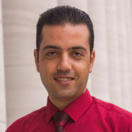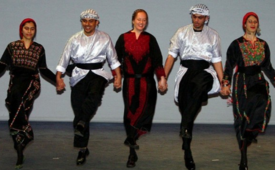January 2019 Humphrey Secretariat Post
 Hi! My name is Islam Abu Sharbain and I am from Palestine. I work as a script writer and content developer at UNRWA TV in Gaza, where I support the production of educational programming for the refugee population in the region. I have taught English in various capacities, including as teacher at UNRWA, associate professor at Al Quds Open University, lecturer at the University College of Applied Sciences, and instructor at AMIDEAST. I have worked as a trainer and consultant for IHH and as a research assistant at Universiti Sains Malaysia. I was also a founding and steering committee member in the Palestinian English Language Teachers’ Association (PELTA), which has engaged with over 300 English language teachers from the region.
Hi! My name is Islam Abu Sharbain and I am from Palestine. I work as a script writer and content developer at UNRWA TV in Gaza, where I support the production of educational programming for the refugee population in the region. I have taught English in various capacities, including as teacher at UNRWA, associate professor at Al Quds Open University, lecturer at the University College of Applied Sciences, and instructor at AMIDEAST. I have worked as a trainer and consultant for IHH and as a research assistant at Universiti Sains Malaysia. I was also a founding and steering committee member in the Palestinian English Language Teachers’ Association (PELTA), which has engaged with over 300 English language teachers from the region.
I hold a PhD in TESOL from the Universiti Sains Malaysia (Malaysia), a Masters in TESOL from the Islamic University of Gaza (Palestine) and a Bachelors in TEFL from Al Aqsa University of Gaza (Palestine). Within the framework of my PhD research, I designed and implemented a professional development program tailored for ESL teachers in Gaza; a total of 150 pre-service teachers from five universities successfully completed my four-month training program. In addition, I have authored a number of publications on TESOL professional development and teaching practices.
During the Humphrey Fellowship, I am working on developing a comprehensive Social and Emotional Learning SEL training program for ESL teachers in Gaza which considers the unique context of emergency-affected regions and the unique needs of students who have experienced trauma. I look forward to professional networking opportunities with ESL organizations and educational institutions with psychosocial support programs. Upon my return to Gaza, I intend to implement the SEL program and strengthen ESL education outreach programming and leverage international partnership opportunities to expand professional development opportunities for local ESL teachers.
I believe in the transformative power of education and I am convinced that my country, Palestine, has to invest much in delivering high quality education and train the next generation of professionals who will be able to work hard and develop my country. I also believe that it is through providing quality education that my country will have professionals who have skills to be leaders and entrepreneurs and who will be able to impact the future of Palestine.
Despite the several excruciating wars Palestine has gone through since 1948 that reshaped its geography and the cruelties the Palestinian people have experienced as a result of the brutalities of the occupation especially in the ongoing siege of Gaza and repeated attacks, Palestine is a very beautiful country that packs a lot of stunning nature and religious archeological monuments into a small space.

Over 45 million tourists from all over the world come to visit Palestine for religious or touristic purposes every year. Holy places are located in many of the Palestinian cities. Bethlehem is a destination of more than 2 million tourists every year most of whom are Christians doing pilgrimage to the Church of Nativity. Jerusalem is one of the oldest & holiest cities in the world, home to important religious sites for the world’s major monotheistic faiths. Al-Aqsa mosque is considered the first prayer direction (Qibla) and third mosque (Al-Haram) for all Muslims in the world.

The Church of the Holy Sepulcher where Christians believe Jesus the Christ was buried is located 2Km to the north of Al-Aqsa mosque.
Palestinians speak Arabic. Common greetings are As-salam alaykum (Peace be with you), with the reply of wa ‘alaykum as–salam (Peace be with you, too). Ma’assalama means “goodbye,” with the literal translation being “go with peace.” “Thank you” is Shukran, and “You’re welcome” is ‘Afwan.

Common names for boys are Ahmad, Shukri, Ismàil and Ibrahim. Muhammad is a very common Muslim name. Hanna is a very common Christian name. Ìsa (Jesus) is used by both Muslims and Christians. Common names for girls are Fatima, Sawsan, Maysoon, Muna,and Samia. On rare occasions girls are given religiously significant names such as Aqsa (Jerusalem).
Palestinians of the older generation still wear traditional clothing. Men wear a long loose robe called a jallabiyeh and the common Arab headscarf, or kaffiyeh, held in place with a twisted band called an ogaal. Women wear a long black peasant dress (known as a thob) with an embroidered bodice, and a shawl over the head and shoulders.
